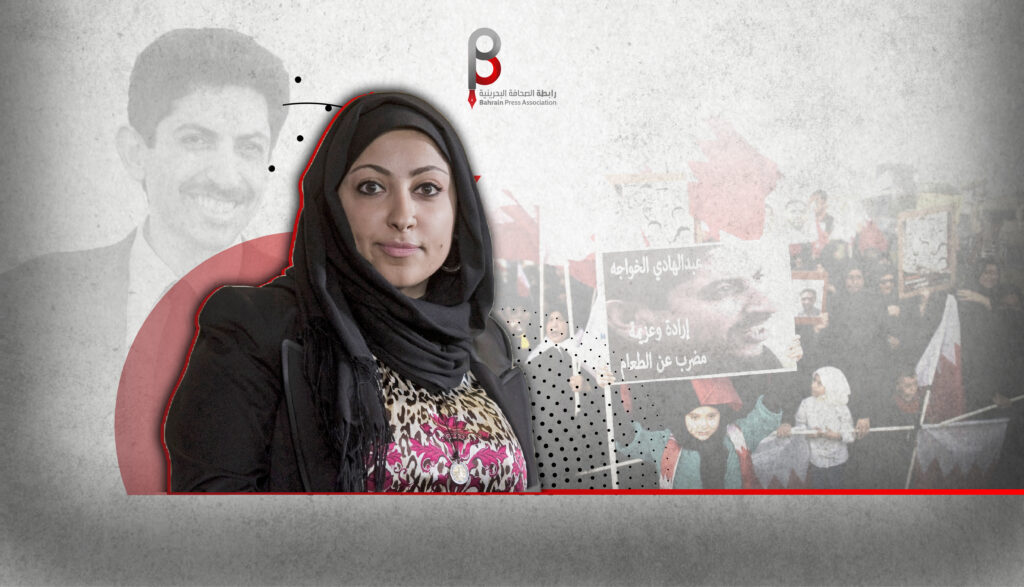Maryam Adbel-Hadi Al Khawaja: The Motherly Daughter

Maryam Abdul Hadi Al-Khawaja not only inherited her father’s commitment to advocating for human rights but also found herself destined to take on the role of a supportive mother for her father and share the weight of considerable pain and exhaustion with him.
Maryam, along with her family, sought refuge in Denmark until 2001, when Abdul Hadi Al-Khawaja and his family were allowed to return to Bahrain. However, due to her father’s stance opposing Bahraini authorities, she was unable to start her professional life except as an external relations specialist at the Bahrain Center for Human Rights (BCHR)—a center that her father helped establish in 2010.
Prior to that, Maryam had a keen interest in bringing attention to human rights violations and issues of freedom in Bahrain. In 2006, she took part in a delegation to the United Nations building in New York, where she had the opportunity to meet with the Assistant Secretary-General of the United Nations. During this meeting, they presented a petition urging the resignation of the Prime Minister at that time, Sheikh Khalifa bin Salman Al Khalifa, due to his government’s human rights violations.
In 2008, Maryam Al-Khawaja was invited by the Tom Lantos Human Rights Commission to testify before the U.S. Congress on the topic of religious freedom in Bahrain. Following her testimony, she, along with other activists, experienced a widespread attack from media outlets associated with the government.
At the forefront of 2011 uprisings
During the 2011 protests, Maryam joined her father, who had been arrested and tortured, in the demonstrations that took place in Bahrain in February 2011. Following these events, she embarked on an international tour, participating in various events and human rights conferences to address the human rights situation in Bahrain. During her travels, she engaged with politicians, human rights activists, and officials in the United States and Europe. Additionally, Maryam delivered speeches multiple times at the United Nations Human Rights Council in Geneva.
In the same year, Maryam had the opportunity to meet with U.S. Secretary of State Hillary Clinton while participating in the U.S.-Islamic World Forum. During their encounter, she briefed Clinton on her father’s arrest and that of two other relatives, urging her to exert pressure on the Bahraini government to halt the violence and suppression directed at its opponents.
In May 2011, Maryam spoke at the Oslo Freedom Forum about her experience with government violence in Bahrain. She presented evidence during a U.S. Congress hearing on human rights violations in Bahrain.
Throughout her years of activism, Maryam encountered harassment from government supporters and became the target of smear campaigns on social media. The numerous threatening messages she received even deterred her from participating in an event organized by the International Network for Defending Freedom of Expression (IFEX) in Lebanon in early June 2011. Due to concerns for her safety, human rights organizations strongly advised Al-Khawaja against returning to Bahrain.
Government Harassment and Persecution
In August 2014, Maryam Al-Khawaja made the courageous decision to undertake an uncertain journey and return to Bahrain to visit her father, who was serving a life sentence for his peaceful involvement in protests. Upon her arrival, authorities detained Maryam on charges of “assaulting a police officer at the airport.” After spending twenty days in detention, international human rights organizations exerted pressure, leading to her release on bail. Subsequently, she left for London once the travel ban was lifted. In December of the same year, a Bahraini court issued an in-absentia sentence of one year in prison against Maryam for the alleged assault.
Maryam continues to be in the spotlight, tirelessly working to draw attention to her father’s case. He has been in prison for the twelfth consecutive year, facing a critical health condition that demands essential medical care. Despite Maryam’s pleas and the appeals of numerous human rights organizations worldwide, Bahraini authorities continue to disregard the calls for justice.
On September 7th, Maryam declared her intention to return to Bahrain with the aim of pressuring the government to provide assistance to her father, even in the face of potential arrest. Despite the standing judgment against her was issued nine years ago, the Bahraini government considers it still valid. Maryam expressed that her return is an effort to “increase pressure and attention on her case and the case of 800 political prisoners in Bahrain who are on hunger strike.” She planned to travel alongside other human rights activists, including Agnes Callamard, the Secretary-General of Amnesty International, Tim Whyte, the Secretary-General of Action Aid-Denmark, Andrew Anderson of Amnesty International, and Olof Morris, the acting director of Front Line Defenders, of which Abdul Hadi Al-Khawaja was a member.
On September 15th, Maryam announced that she and her foreign companions were prevented from boarding the plane on her scheduled flight from London to Manama. The Bahraini government intervened, contacting the airline and requesting that Al-Khawaja be denied entry into the country. This development coincided with Bahraini authorities canceling the planned visit of a delegation from the UN Human Rights Commissioner, which was intended to span four days and assess prison conditions in the country.
Maryam and her family persist in navigating the uncertainties of fate, hopeful for a reunion with their distant father. Meanwhile, the Bahraini government maintains an unyielding policy towards political opponents and human rights activists. Although the government initiated two positive projects, sponsored by the U.S. and the UK—the Open Prisons Law and Alternative Sanctions—Al-Khawaja has yet to benefit from them. Nevertheless, Maryam remains determined, akin to a mother who cannot fathom abandoning her child, to continue her efforts.